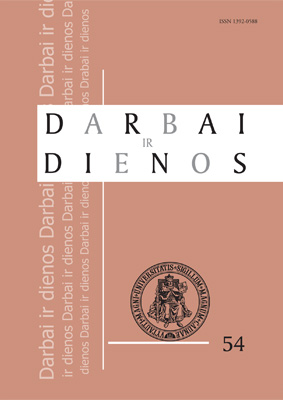Nauji žydų svetimumo aspektai XX amžiaus trečiojo – ketvirtojo dešimtmečių lietuvių periodikoje
Emerging New Aspects of Jewish Alienation in the Lithuanian Press in 1920–1940
Author(s): Linas VenclauskasSubject(s): Cultural Essay, Political Essay, Societal Essay
Published by: Vytauto Didžiojo Universitetas
Keywords: susvetimėjimas; interwar; tarpukaris; periodika; Jews; alienation; press
Summary/Abstract: Per laiką lietuvių periodikoje nusistovėjo dichotominė struktūra (įsitvirtinusi XX a. trečiąjį–ketvirtąjį dešimtmetį), kurios vienoje pusėje vaizduoti „akiplėšos“ žydai, o kitoje – „tolerantai“ lietuviai. Dalyje ketvirtojo dešimtmečio lietuviškų publikacijų vis ryškiau galime matyti perspėjimus žydams, jog lietuvių kantrybė visai išsekusi ir žydai privalo paklusti lietuvių reikalavimams, kitaip konfliktas gali tik didėti, o nemažai autorių pabrėžė, kad įtampa jau pasiekė viršūnę ir bet kokios žydų „privilegijos“ turi būti kuo greičiau panaikintos. Šią būtinybę autoriai ragina suprasti ir pačius žydus, nes tariamas jų padėties išskirtinumas ne tik erzina, bet ir žemina lietuvius. Be mūsų jau aptartų žydų keliamų „problemų“, kai kurie autoriai vėl iškėlė XIX a. antroje pusėje spaudoje svarstytus klausimus, pavyzdžiui, lietuvių tarnystę pas žydus. Autoriai apeliuodami į lietuvių savigarbą pabrėžė, kad tarnauti žydams ne tik gėda, bet žiūrint į „žydbernius“ kitiems, save gerbiantiems lietuviams darosi skaudu. Šis naujas akcentas leidžia daryti prielaidą, kad lietuvių pasitikėjimas savimi buvo gerokai išaugęs, jie ne tik ragino tautiečius vienaip ar kitaip elgtis, bet netgi teisė ir smerkė. The article presents an analysis of the transformations of rhetoric identified in the Lithuanian press in the publications on the “Jewish question”. The established tradition of the Lithuanian press was to picture the Lithuanian Jewish community as a problematic national minority. There were statements voiced to the effect that Jews did not support the main goals of Lithuania, that instead of Lithuanian they were using foreign languages (first of all, Russian and German) for communication. In addition, the generally accepted view was that Jews were over-dominating in Lithuanian economic life. Such opinions were still common in the 1920s and 1930s; however, at that time slightly different attitudes were already emerging reflecting some changes in the Lithuanian mentality, especially the idea that every group within the Lithuanian society should know its place and perform a particular role. As regards the rhetoric concerning the Jewish community, more authors began to escalate the question of Jewish alienation based on differences in national psychology or even race. They argued that Jews were not able to change in principle, and it could be difficult to Lithuanize them or to make them more pro-Lithuanian. It is due to this reason that both Jews and Lithuanians should know the status and position of both communities in the society. Lithuanians were seen as owners of the state, and Jews were encouraged to accept this idea in order to avoid conflicts on this issue in the future.
Journal: Darbai ir dienos
- Issue Year: 2010
- Issue No: 54
- Page Range: 75-93
- Page Count: 19
- Language: Lithuanian

